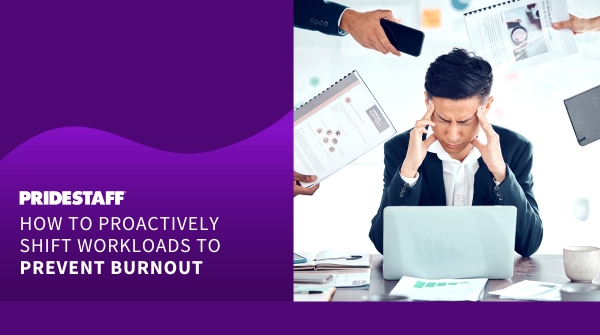Balance the Load: Keys to Proactively Shift Workloads to Prevent Burnout

Burnout is a retention and productivity killer—and a pressing concern for both employees and employers in today’s fast-paced work environment.
Maintaining a healthy work-life balance and effectively managing workloads is essential to prevent burnout, and the responsibility must be a shared effort.
Here are some unique ways to help your employees balance their workloads:
Recognize the Signs
As the popular saying goes, “An ounce of prevention is worth a pound of cure.” Recognizing the signs of workload imbalance and burnout is the first step in addressing the issue. Employers should promote open communication and create a supportive environment where employees feel comfortable discussing their workload concerns. Stay alert for common signs of burnout, including:
- decreased productivity
- chronic fatigue
- increased errors
- a decline in mental and physical well-being
Prioritize Workload Management
Employers should assess each team member’s workload, taking into account their skills, experience, and capacity. Strategies such as workload distribution, setting realistic deadlines, and leveraging technology and automation tools can help optimize task allocation and prevent overload. Regularly reviewing and adjusting workload distribution based on employee feedback and changing circumstances is crucial for maintaining balance.
Encourage Work-Life Integration
Encouraging work-life integration is vital to support employees’ overall well-being and productivity. Organizations can foster a culture that values work-life balance by promoting flexible work arrangements, offering wellness programs, and providing resources for stress management and self-care. Encouraging employees to take regular breaks, disconnect from work during non-working hours, and engage in activities that promote physical and mental well-being can help prevent burnout and promote a healthier work environment.
Collaborate and Delegate
Building a culture of shared responsibility for workload management involves collaboration and effective delegation. Employers should encourage teamwork, communication, and collaboration among team members. Delegating tasks based on employees’ strengths and interests helps distribute the workload and fosters employee growth and development.
Looking for the right talent to support workload management and promote a healthy work environment? Contact your local PrideStaff office to discover how we can help!
Related Posts
The Difference Between Hard Work and Overworked
Preventing Burnout in Remote Workers



